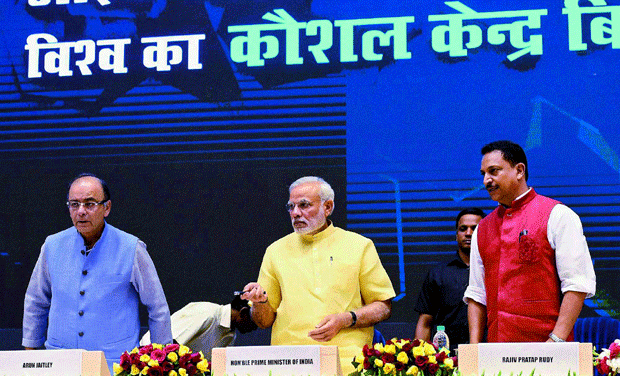What makes students dull and uncompetitive? Why is the Skill India mission an absolute failure for the urban educated youths? And why is the youth drifting away from active governance?
What does an enlightened mind of a graduate student contemplate? It focuses on understanding and decoding life’s most unconventional questions. No, it’s not what you’re thinking –nothing even roughly close to life on Mars, or time-travelling. It tends to justify questions like that of- What is a full-time work experience? Does it include valued internships? Or Research Projects that one invest himself in, besides academics? What is the necessity and valuation of a fulfilled biannual “internship break” or a Research Project submission mandated by premier Indian Institutes? Does it actually have some real tangible benefits and utility after graduation?
Recently, a report by Centre for Monitoring Indian Economy (CMIE) was discussed and cited in the last Lok Sabha session. It states that, “an estimated 10 million jobs were lost in both rural and urban India last year”. The reasons for which are the usual – growing population, shortage of well-trained formal skilled workforce among others. However, what is interesting is the fact that the Central Government’s highlight and solution on the issue of unemployment has been the Skill India Mission (2015). The programme was launched on a “Mission Mode” to enhance prospects of the educated workforce which had little or no job skills, making them largely unemployable. However, the objective of the Mission itself is unconvincing and unsatisfying. It is astounding that the government did not consider analyzing the problem thoroughly. Instead, it called for a “Mission Mode” campaign spending close to 17,000 crore last year (Budget) when it could just solve the skill set enhancement problem for free, coupled by sheer willpower to resolve.
How? The universities across India mandate “Internship breaks”, Research Projects and Field-trainings. The idea behind these kinds of work experiences and trainings is to enhance skills of students and ensure their practical transition into the profession. The students are at liberty to make decisions and grow in their choice of skill-enhancement. The universities encourage research projects and field trainings under a professor, or at a firm or a company or with a centre. If the greatest hiccup was lack of skill sets, why did the government not encourage institutionalizing the internship/ training culture? It instead opted for an alternative route that failed in its core objective — to provide skill sets to ensure jobs for the educated class. Neither did it create jobs nor did it boost the skills of the graduated students.
Why would a student toil interning, acquiring experiences and skills for all his college years; undertaking projects and working on fields instead of ‘Netflix and Chilling’ if at the end there is nothing substantial in terms of the outcome. If and if at all the government is genuinely keen on enhancing skill sets and creating jobs for students, it must work on institutionalization of graduate-level trainings and opening up contract vacancies to candidates who are competent through their skill enhancement trainings at graduate-level. They must act on considering college-level experience for contractual jobs. What makes our Government insensitive and inconsiderate towards the hard work and enthusiasm of the young, capable and competent? The policies of paradox!

